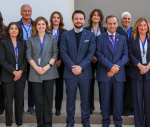You are here
Twin realities uncovered by the war on Gaza
Nov 28,2024 - Last updated at Nov 28,2024
It has been over a year since Israel’s war on Gaza began—a year of genocide, mass displacement, systematic destruction and unprecedented levels of dehumanisation of Palestinians in Western media. Since then, the conflict has intensified and expanded across the region, with escalations seen in the West Bank, an invasion of southern Lebanon, and strikes seen in Syria, Yemen and Iran.
The War on Gaza has uncovered twin realities currently at play in parallel, one of active international cooperation and another of blatant disregard for the very principles upon which such cooperation was built. While the war’s violations are ignored, the promotion of human rights and climate agendas globally persists by the very sponsors of Israel’s aggression. It has become clear, then, that those international commitments and (foreign) policy decisions are being exercised in isolation rather than in tandem to develop evidence-based policies.
International human rights commitments
The twin realities are first and foremost evident through the human rights commitments determining international engagement. Although human rights are the foundation of our era, the ‘glaring double standard’ in addressing the War on Gaza has never been more evident. While violations of human rights, including freedom of expression, in ‘partly free’ or ‘less free’ countries are routinely condemned, there have been crackdowns on protests and the marginalisation of Palestinian voices in countries that pride themselves on their democratic values and promote freedom of speech abroad. Additionally, algorithmic censorship by online platforms has limited freedom of expression, access to information and public discourses around the Palestinian cause and the War on Gaza.
In Gaza and the West Bank, the Israeli occupation has been rampant in its infringements on freedom of speech. As of November 12, 2024, 137 journalists and media workers have been killed since the beginning of the War on Gaza, with at least five journalists being directly targeted by Israel. The number of journalists killed is unmatched in any conflict in recent history. Israel has also shut down Al Jazeera’s offices in the occupied Palestinian territories and Israel.
In parallel to violations of freedom of expression by the most powerful countries, they continue to promote these principles and fund human rights projects abroad. This has uncovered the double standard and the rift between international commitments and decision-making.
Climate change agenda
Another instance of the twin realities is the climate change agenda. While mitigating climate change is at the top of the international agenda, the war on Gaza has led to mass environmental destruction in an already climate-vulnerable region.
Prior to October 7, 2023, Gaza had already struggled with a multitude of environmental issues due to previous Israeli aggressions and the continued occupation. The genocide in Gaza has not stopped at taking human lives; it has also devastated infrastructure, the ecosystem and wildlife, with a public health crisis already in full force. Scientists have estimated that the emissions in the first two months of Israel’s aerial bombardment and ground invasion of Gaza alone “were greater than the annual carbon footprint of more than 20 of the world’s most climate-vulnerable nations”.
Countries that are working towards their international 2030 climate commitments are simultaneously turning a blind eye to Israel’s raging war that is hindering regional and global progress. The direct catastrophic results are unfolding in Gaza, and the consequences will be felt across borders, both in the WANA region and beyond, in the form of rising sea levels, natural disasters, and migration flows, to name a few.
Moving forward
The war on Gaza has brought the twin realities to the forefront, undermining the credibility of the current international regime. At a high price, this war has reaffirmed the double standard and the lack of an intersectional approach to tackling global issues grounded in political interest rather than evidence-based policies. As people in the WANA region attempt to shape their futures in light of the devastation of their present, knowledge institutions and civil society must resiliently work on forging more inclusive structures of cooperation and bringing forward regional perspectives to shape the narrative, advocating for more evidence-based decision-making on the national and international level.
Salma Nasser - West Asia-North Africa (WANA) Institute












Add new comment